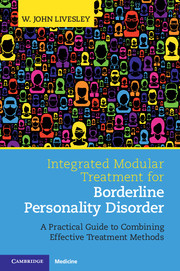 Integrated Modular Treatment for Borderline Personality Disorder
Integrated Modular Treatment for Borderline Personality Disorder Book contents
- Frontmatter
- Dedication
- Contents
- Preface
- Section 1 Introduction and Framework for Understanding Borderline Personality Disorder
- Section 2 Assessment and Treatment Planning
- Section 3 General Treatment Modules
- Section 4 Safety, Containment, and Engagement: The Initial Phase of Treatment
- Section 5 Improving Emotional Regulation and Modulation
- Section 6 Exploration and Change: Treating Interpersonal Problems
- Section 7 Constructing an Adaptive Sense of Self
- Introduction
- 21 Building a More Coherent Self
- 22 Promoting an Adaptive Self-Narrative and Flexible Working Selves
- 23 Getting a Life, Constructing a Personal Niche
- Section 8 Retrospect and Prospect
- References
- Index
22 - Promoting an Adaptive Self-Narrative and Flexible Working Selves
from Section 7 - Constructing an Adaptive Sense of Self
Published online by Cambridge University Press: 16 February 2017
- Frontmatter
- Dedication
- Contents
- Preface
- Section 1 Introduction and Framework for Understanding Borderline Personality Disorder
- Section 2 Assessment and Treatment Planning
- Section 3 General Treatment Modules
- Section 4 Safety, Containment, and Engagement: The Initial Phase of Treatment
- Section 5 Improving Emotional Regulation and Modulation
- Section 6 Exploration and Change: Treating Interpersonal Problems
- Section 7 Constructing an Adaptive Sense of Self
- Introduction
- 21 Building a More Coherent Self
- 22 Promoting an Adaptive Self-Narrative and Flexible Working Selves
- 23 Getting a Life, Constructing a Personal Niche
- Section 8 Retrospect and Prospect
- References
- Index
Summary
Throughout this volume, I have noted the importance of stories in making sense of our experiences, regulating our mental states, mobilizing our resources, and organizing our transactions with the world. Throughout therapy, patients are helped to construct new narratives about diverse aspects of their lives, experiences, relationships, and personality. Now, the task is to combine these narratives into a more global conception. This is not something that can be achieved in a formal way – it is not a matter of simply getting patients to write a new narrative. Rather, it needs to emerge as part of the process of therapy so that it is fully integrated with other aspects of personality functioning. Since there is little research to guide therapists on how best to help patients construct a self, we need to be clear about the functions of self-narratives and have a broad understanding of what they should include.
Function and Structure of Self-Narratives
Our self-narrative organizes what would otherwise be a jumble of experiences into an overarching map of our lives, our world, and our place in it, which explains who we are and how we came to be this way. Narratives give meaning to self-knowledge and make it available as a resource for organizing action and regulating experience. They provide a high level of integration by (i) describing the relationships among life experiences, personality features, and behaviour; (ii) showing how events and experiences are related across time; (iii) providing thematic coherence and continuity by highlighting important themes that span the epochs of our lives; (iv) connecting events to personal qualities – traits, beliefs, and values – in a way that weaves an understanding of the interplay between our personality and life experiences; and (v) providing a form of explanatory coherence by including a developmental perspective on the experiences that shaped our lives and personality and, perhaps, how our personality has shaped our experiences and interactions with the world. This description of the contribution self-narratives make to integration illustrates the kinds of narrative understanding we need to promote in therapy.
But self-narratives are not just stories about a person's life. They also incorporate scripts – elaborate schemas that embody knowledge about events and situations, making it accessible to manage the problems of everyday living.
- Type
- Chapter
- Information
- Integrated Modular Treatment for Borderline Personality DisorderA Practical Guide to Combining Effective Treatment Methods, pp. 242 - 254Publisher: Cambridge University PressPrint publication year: 2017


